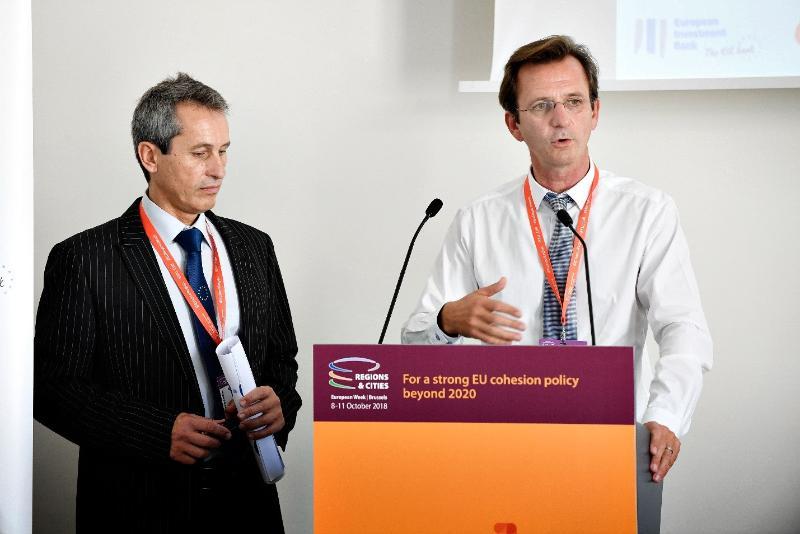Romania infrastructure financing gets a boost from an advisory programme designed to help make the most of EU funds. For ordinary Romanians, the result is that the trains will soon be rolling faster than their current 40 km/h
Romania is the eighth-largest country in the European Union, but its 900 km motorway network is one of the shortest and the average speed on its railways is just 15 km/h for freight trains and 40 km/h for passenger trains.
Romania manages to build little more than 45 kilometres of new motorway per year and some trains run slower than they did 100 years ago. That’s because Romania’s public authorities struggle to manage the complexity of planning and implementing large infrastructure projects with the significant EU funding available. With €17 billion from the European Union budgeted for transport infrastructure by2027, the challenge is to put the money to work.
This is where Alexis Gressier and his European Investment Bank team comes in. On site in Bucharest at the Ministry of Investment and European Projects since 2014, Alexis and his team of seven work alongside the Romanian authorities as part of the European Investment Bank’s Project Advisory Support Service Agreement (PASSA) to prepare, evaluate and implement projects to the EU’s demanding standards. “We like to say that we boost EU-funded projects with our support,” he says.

Mihai Frumosu, EIB Project Advisory Support Service Unit. Right: Alexis Gressier, team leader, EIB Project Advisory Support Service Unit
Advisory aid for Romania infrastructure financing
The work is varied but mainly covers large projects in the transport, waste, water and energy sectors. “We’re involved in various phases of the project cycle, from preparation when there is concept to be clarified, to planning and tendering, as well as managing contracts and project implementation,” explains Alexis.
The team has also played an important role in helping authorities deal with contract modifications and cost-overrun claims from contractors, triggered by a manpower shortage in the construction sector.
By analysing years of claims, as well as a large volume of supporting documentation that include contractual correspondence, technical and financial reports, detailed time programmes, construction logs and thousands of invoices, the EIB’s experts have helped the Romanian authorities lower the contractors' financial claims by 39%, on average.
Added value for Romanian infrastructure financing
As outsiders, it took some time for the Bank’s experts to win the trust and acceptance of their Romanian counterparts, but the team’s success has earned them high praise.
“Perhaps the biggest added value that the EIB has brought to us is that they’ve been able to provide teams with different backgrounds who have experience with operators and transport authorities,” says Stefan Roseanu, president of Romania’s Railway Reform Authority. “This has helped us to conduct very good feasibility studies and other types of documents. The feasibility study they helped us to prepare is now used as a reference example for the Ministry of Transport and the Ministry of European Funds to think about new, further investments in rolling stock.”
The Railway Reform Authority has also been impressed by the team’s technical expertise. “Some of the investments we are working on involve reforms, as well as new technologies and market concepts,” says Roseanu. “Without the EIB’s help, our experts would have had to spend a lot of timing learning and incorporating these new ideas into their work. It would have delayed the process a lot.”

Stefan Roseanu, President, Railway Reform Authority
Romanian infrastructure financing en route to Dresden
One of the biggest projects the EIB team worked on in 2021 is the modernisation of a 144 km stretch of railway track that is part of an EU transport corridor running from Athens all the way to Dresden, via Sofia, Budapest, Vienna, Prague and Nuremberg. Valued at over €2 billion, the rail upgrade, which is part-funded by the European Commission as well as the EIB, is the largest transport infrastructure project in Romania in 30 years.
The upgraded rail lines will allow a maximum speed of 160 km/h for passenger trains and 120 km/h for freight. This will reduce travel times, lower the risk of accidents, and cut CO2 emissions by an estimated 1.5 million tons over the track’s 30-year lifespan.
The PASSA support also involves the purchase of new trains that will be able to run on a number of different national rail networks. The Romanian authorities had not purchased new rolling stock in 20 years and had no experience buying trains that operate on different systems.
“We were missing this kind of experience and analytical expertise,” says the Railway Reform Authority’s Roseanu, “but the EIB was able to produce the first functional terms of reference public procurement document and was able to adapt the templates and information to the rolling stock procurement process.”
